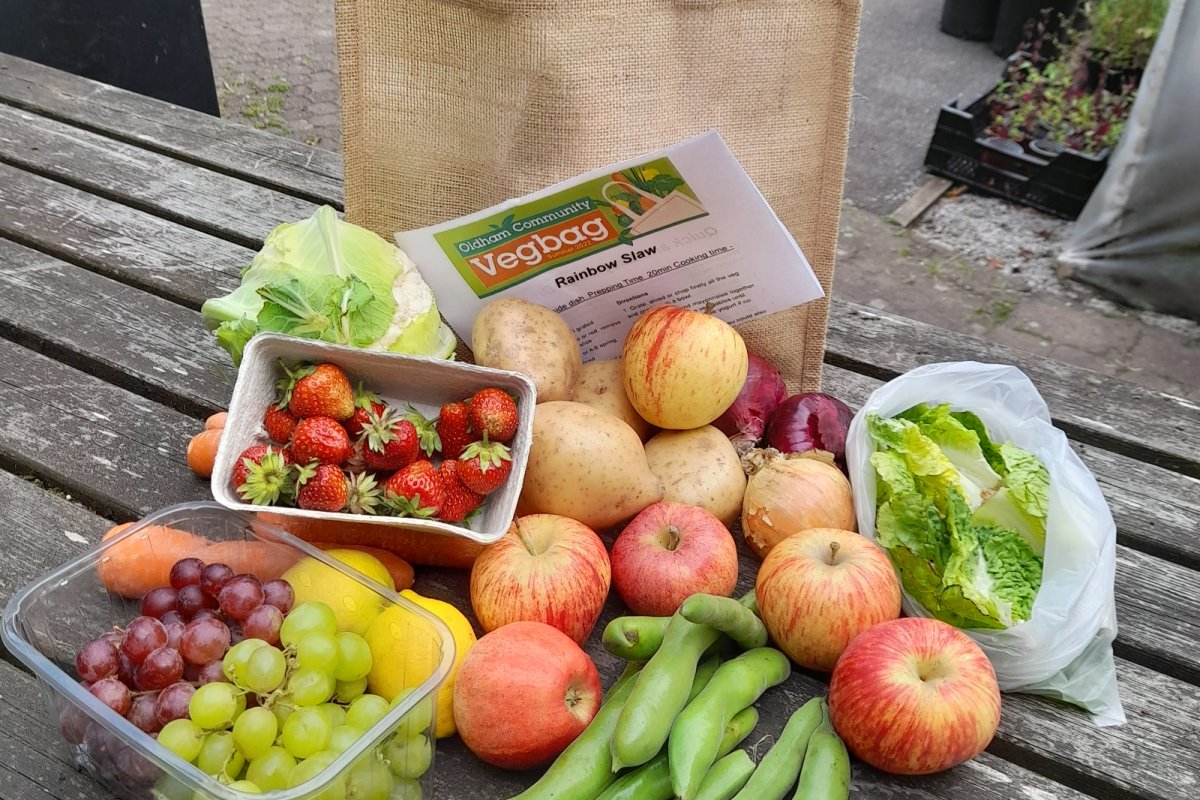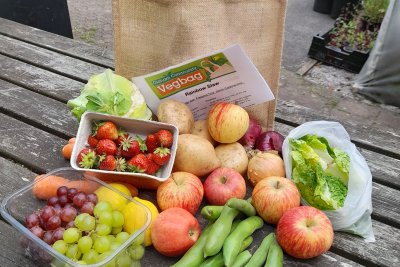 A week's supply of produce in Oldham's Community Vegbag. Credit: Oldham Community Vegbag
A week's supply of produce in Oldham's Community Vegbag. Credit: Oldham Community Vegbag
The Oldham Community Vegbag
The Oldham Community Vegbag is a low-cost weekly fruit and veg bag distributed through community partners, in areas with limited local retail availability of fresh produce or ‘food deserts’. Each week the bag contains eight varieties of seasonal fruit and vegetables, and two weekly recipes based on the contents of the bag.
Business Model
The Oldham Community Vegbag aims to improve access to affordable, nutritious, locally sourced and grown fruit and veg, as well as providing accessible recipes to help people make the most of the produce provided. The fruit and vegetables are sourced from Manchester Wholesale Market and supplemented by produce grown locally on community allotments and growing spaces within Oldham and Greater Manchester. It is priced at £4.00 a bag, the same cost as the wholesale market price, offering a substantial discount to retail price. Households receive a large weekly bag of a variety of eight or more types of fruit and vegetables, weighing approximately 3.5-4kg. The bag contains staples such as potatoes, carrots, onions, and apples plus other vegetables and herbs, as well as two weekly recipes and tips to use the veg.
The Vegbag is aimed at households:
-
Who have difficulty accessing a regular, affordable supply of fruit and veg locally but want to eat healthier food, and can make use of the produce each week.
-
Who may not prioritise fresh fruit and veg in their food shopping due to pressure on household income.
-
Who are interested in learning how to use the produce, gain new cooking skills, try different fruit and veg and possibly grow some of their own produce in the future.
-
Who are pregnant or have young children and are in receipt of Healthy Start, who can use their Healthy Start entitlement to pay for their Vegbag.
The scheme has been promoted in deprived neighbourhoods which are lacking in a retail supply of fresh fruit and veg, areas that can be classified as ‘food deserts’.
Each week, two recipes are provided showing ways to use the produce, using other accessible, affordable and mainly plant-based ingredients. Recipes include low fuel options and simple cooking methods, and alongside the recipes several cookery workshops have been provided, the most popular being a slow cooker Chinese takeaway.
Feedback to the project is encouraged and although purchasing is driven by seasonality and market prices, a wide variety of produce has been included to meet preferences including avocadoes, mangoes, pineapples, and pomegranates.
Participants in the pilot come from diverse backgrounds, with good uptake on estates outside of the town centre where there are fewer fresh food retail options.
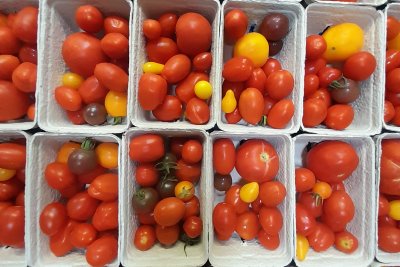
The project had one paid, part-time member of staff working solely on the Vegbag provision for 10 hours per week, who has been instrumental in setting up the social enterprise Local Food First CIC and taking the project from pilot stage to its current trading model. Income from the Vegbag covers the cost of food supply, but the operational and staff costs are currently reliant on external funding and volunteers. As the trading model develops it is intended that increased use of home grown produce and surplus will reduce input costs and reduce the need for funding. In the current transition to a social enterprise, they plan to build in a solidarity payment so that those who could afford to pay more are able to, which would support the community and the financial sustainability of the project.
The Vegbag is closely connected to a community allotment in Fitton Hill, The Wildbrook Food and Growing Hub, which is being redeveloped as a partnership project between Oldham Council and Local Food First CIC. The Vegbag relies on community volunteers and development staff to collate orders, arrange collection and distribution of the bags and collect payment, which should take less than one hour per week in each location.
Impact on the community
As a Public Health funded project, the initial intention of the Vegbag project was to improve access to fruit and veg to people in Oldham, particularly those who struggle to access fresh fruit and veg due to location or low income. The impact has been greatest on older residents leading to a trial of smaller half-sized bags costing £2 and developed in conjunction with Housing 21.
At one location the Vegbag collection has led to an informal coffee morning developing, where people can chat over refreshments when they go to collect their Vegbag.
A one-off Christmas Vegbag collected from the allotment attracted 91 new customers including 32 via a primary school.

The recipes have always proven popular, with some customers reporting keeping them all for later use. Recipes are sourced mainly from local voluntary and community sector organisations such as Cracking Good Food or adapted from resources such as Cooking on a Bootstrap and BBC Good Food. Participants are encouraged and signposted to use the internet to access recipes and ways to use ingredients.
One participant who now runs and organises their local collection and local packing of the vegbags said:
'This scheme is an absolute lifesaver here, there is no availability of fresh fruit and veg…The recipes are great, and I've kept all of them in a folder'.
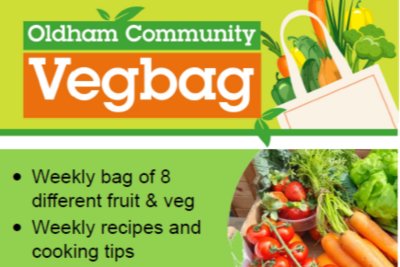
Food supply and logistics
The fruit and veg is sourced primarily from one wholesaler at New Smithfield Wholesale Market in Manchester each Wednesday and taken for packing in a community room at a sports club six miles away in Oldham.
The bags are packed and delivered to five partner locations across Oldham; three community centres in Holts and Primrose Bank, one family hub in the town centre, and they are also available from a Community Allotment in Fitton Hill. During the pilot various operational models have been trialled including delivering the produce in bulk for the groups to pack themselves, different types and sizes of bag including returnable hessian, and smaller bags for elderly/one person households. Currently the weekly order number is around 35-40 bags, reaching approximately 100 people – there is no weekly commitment and around 60 households order across a monthly period. Orders are collated by a volunteer in each location who orders, collects payment, and facilitates the distribution to their customers. There is no limit on the number of households that can access it and it is open to more households. It is currently operating at a break-even model.
An example bag would include 1.1kg of potatoes, 5-6 carrots (700g), 2-3 onions (400g), 400g cherry tomatoes, small white cabbage, 6-7 apples, 8 satsumas and a punnet of grapes.
Between April and November 2024, they aim to use more produce grown locally either from Oldham Council’s growing projects or through donated allotment produce – over the last two years the bags have regularly included home grown salad and herb bags, tomatoes, leeks, kale, spinach, plums, apples and less regularly (once or twice a season) new potatoes, onions, garlic, radish, cucumber, sweet peppers, squash, currants, berries and pears. A connection with students from the Botany Department at University of Manchester has proven very successful in accessing both produce and advice. As the Vegbag develops with the social enterprise more focus will be required on growing our own produce, gleaning and developing access to surplus.
So far, the quantities of produce involved have allowed transport and delivery to be made in an estate car, but with the intended expansion of the project a small van will become a priority. Produce is collected and packed each Wednesday and delivered on Thursday mornings. Outside of periods of high summer temperatures the produce is stored mainly at ambient temperatures, with some requirement for refrigeration for items like salad bags. By nature of the prices available from the wholesaler, some produce is class 2 or near to the end of use, and careful grading can be required.
Funding and opportunities for social investment
As the pilot was initiated and funded by Oldham Council Public Health team and facilitated by Environmental Services, it has a strong connection and support from the local authority. The wider project at the community allotment to develop the Wildbrook Food and Growing Hub will provide dedicated facilities for storage, packing, food handling and consequent registration as a food business.
From an early stage the intention of the pilot was to break even on produce costs. In summer 2022 this was possible at £3 per bag but following significant increases in produce costs during the cost-of-living crisis, as of early 2024 the bag now breaks even at £4 per bag. Cost comparisons with supermarkets have shown this to be up to 50% of the equivalent cost of buying the same products at a supermarket. The £4 budget is achieved by balancing the staple veg costs against the more expensive fruit items. For example, cases of 120 apples can cost £12, while seedless grapes are 80p - £1 a punnet.
The project aims to accept Healthy Start payments, although this has created logistical issues as it is necessary to provide a card reader at the various locations which is an ongoing process. The presence locally of the Vegbag has raised the profile of Healthy Start in two locations: both at the Family Hub and at a local GP surgery, making Healthy Start a talking point, encouraging uptake, and signposting to other work.
The model as it currently operates is not financially sustainable without funding to support the operational and staff costs. Alternatively, it could be run by a small team of volunteers at individual locations removing the staff costs but increasing reliance on volunteer time. With the transition to the social enterprise, they are focusing on reducing input produce costs and operational costs, meaning savings are expected to come through including more produce grown on the community allotment, developing gleaning networks, and including surplus food. The Vegbag has worked well in partnership with Housing 21, a not-for-profit provider of Retirement Living and Extra Care for older people of modest means. It is planned that links will be developed in neighbourhoods with local social housing partners who contribute towards operational costs as social investment to increase availability of fresh fruit and vegetables for residents.
Overview of Costs for 30 Vegbags with one part-time staff member:
|
Item |
Cost (weekly) |
|
Staffing |
£150 (10 hours a week) |
|
Food |
£120 |
|
Equipment |
Bag for life @ £0.12 = £3.60 |
|
Vehicle 20 miles @0.45 per mile |
£9 |
|
Total cost |
£282.6 |
|
Total income |
£120 |
Challenges
The main challenge for the project has been finding partner community organisations with a volunteer co-ordinator per location and then keeping them motivated in project delivery.
Fluctuating costs are also challenging, with changes to seasonal and traded prices impacting on breaking even. In any community food project, there are plenty of less apparent costs, like transport, vehicle insurance and storage facilities.
Running fruit and veg provision can be time consuming and frustrating, and customers are the first to tell you about a rotten onion or soft tomato. Some level of creativity is also needed when people don’t turn up to collect or cancel last minute, so having a short notice taker is always useful.
A Vegbag is prescriptive, and people don’t always want to take the listed produce, some would prefer to have more choice. It is possible to be adaptable, for example, one group decided that they would prefer to run a market stall, which was trialled with some success. However, as they were dealing with fresh produce difficulties came in predicting take up and produce being left over afterwards, which impacts ability to break even. Run in combination with other community food projects this would offer an optimal situation, as any leftover or damaged produce could be used for cooking community meals.
As a pilot funded by Oldham Council the project has received excellent support, but by nature it has been necessary to borrow space for packing, storage, transportation which creates insecurity etc.
Future plans and aspirations
Going forwards, there is potential to further develop the Vegbag provision. Previously, the main access point has been through community settings, with only one publicly available pay-on-delivery pick up location based at the community allotment.
With the development of the Food and Growing Hub at the allotment there is an excellent opportunity to use the dedicated facilities, provide more choice of produce, offer different pick up times, and be more reactive with opportunities of accepting produce. There also is the opportunity to develop the model and explore options such as home delivery and expand partnership working with local services such GP surgeries and social prescribers.
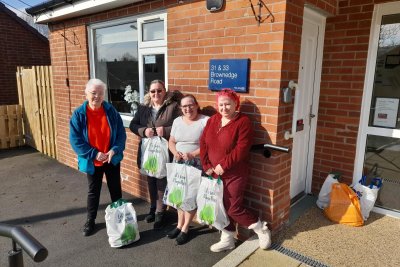
Top tips for others starting or running similar enterprises
- Always try and buy clean produce in good condition, as it is time consuming and morale defeating to deal with too many rotten carrots!
- Talk to the supplier/wholesaler about the project – they may be sympathetic to the project needs and keep back suitable produce. It can be helpful to them to have a small-scale user who can accept split/damaged packaging.
- Ask the customers for feedback – what produce they like, which recipes they enjoyed – and use this to help shape the Vegbag.
If you would like more detailed help with setting up a Community Vegbag provision email Dave Hanlon at localfoodfirst@outlook.com , who would be glad to help out.
Oldham Council – Local Food First CIC
The ‘Oldham Community Vegbag’ was developed from a 2-year pilot conducted by Oldham Council to research and trial ways to improve access to affordable, locally grown and sourced fruit and vegetables. From January 2024 the Vegbag project operations are making the transition to a recently created social enterprise: Local Food First CIC.
Good Food Enterprise: Working to provide food that is good for people and the planet, and support local production playing a part in community beyond trading.
Sustain
The Green House
244-254 Cambridge Heath Road
London E2 9DA
020 3559 6777
sustain@sustainweb.org
Sustain advocates food and agriculture policies and practices that enhance the health and welfare of people and animals, improve the working and living environment, promote equity and enrich society and culture.
© Sustain 2024
Registered charity (no. 1018643)
Data privacy & cookies
